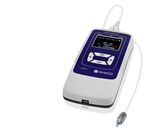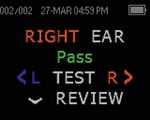ERO SCAN Otoacoustic Emission Testing - Newborn Hearing Screening
←
→
Page content transcription
If your browser does not render page correctly, please read the page content below
ERO•SCAN – Theory
Otoacoustic Emissions
Evoked Otoacoustic Emissions (OAEs) are soft sounds returned by the inner ear as a response to a sound event. The inner ear contains hair cells,
which are responsible for transforming the sound signal to a nerve potential, that is processed in the brain. These hair cells respond to sound by
vibrating. The vibration produces a very quiet sound, that echoes through the middle ear to the ear canal. With very sensitive microphones, this
sound can be measured.
TEOAEs are evoked by a transient stimulus, DPOAEs are evoked by a pair of pure tone stimuli.
Visual Evaluation
Middle Ear
Cochlea
Eardrum
Ear Canal
Tympanometric Evaluation OAE Evaluation
OAEs only occur in a normal functioning cochlea with normal hearing sensitivity. If there is damage to the cochlea (more specifically to the outer
hair cells) or middle ear, OAEs will not be present.
OAEs are measured by placing a small probe into the patient’s ear. The probe presents a stimulus and records the soft sounds generated in the
cochlea. The test does not need any kind of cooperation of the patient and the test result is shown immediately after the test is finished.
With the ERO•SCAN a test result with a PASS means OAEs were detected. A REFER screening result means, that no clear response could be
measured. The patient might be at risk for possible hearing loss and therefore communication difficulties. Further diagnostic assessment of the
patient’s state of hearing is recommended.ERO•SCAN – OAE Testing for all ages Newborns School Children Toddlers Adults Applications Newborn Hearing Screening Worldwide approximately two of thousand babies are born with permanent hearing loss. The measurement of otoacoustic emissions is a standard procedure to screen newborns for hearing loss. Early detection of babies with hearing loss is essential for providing best possible support to them. School Screening When entering the school, children need to be screened for hearing impairment again since it is possible that the children developed a hearing impairment over the years. The measurement of otoacoustic emissions offers a fast and objective method to evaluate children’s hearing. Detecting children with hearing loss prevents them from speech, language or learning problems. Diagnostic Evaluation for all Ages In combination with pure tone audiometry, immittance testing and auditory evoked potentials, otoacoustic emissions are used for detailed diag- nostics of hearing impairments. Otoacoustic emissions provide important information on the patient’s auditory system to make a reliable diagnosis.
ERO•SCAN Features & Benefits
Feedback on the placement of the probe Detailled user feedback on the progress Easyly comprehensible result screen
of the test
Results are Displayed as PASS or REFER
The ERO•SCAN’s automated test procedure provides easy to read
results. The operation of ERO•SCAN is extremely intuitive and tests
can be conducted in less than 30 seconds per ear.
Reliable, Objective Testing
The patented ERO•SCAN noise rejection algorithm allows for reliable
testing even in moderate background noise. This leads to fewer false
refer results.
Portability Optimized Probe
The small and lightweight ERO•SCAN is a hand-held unit with The ergonomic micro-probe is perfect for attaining a tight ear seal
rechargeable battery. The battery lasts for more than thousand tests with no effort. Made of aluminum the probe is extremely endurable.
between charges. It allows you to move from room to room with The single-use probe tubes prevent the system from being clogged.
ease. The system can be used with a wide range of different ear tip in
different sizes.
Managing and Reporting Data
Results can be printed via a wireless printer directly from the
ERO•SCAN or a connected computer, by using the optional Sessions
PC software. The dedicated HearSIM™ database allows managing
of newborn hearing screening results as well as exporting of screening
results to HiTrack or Oz .ERO•SCAN Versions Screening The ERO•SCAN with screening functionality provides rapid measurement and documentation of DPOAEs or TEOAEs at multiple frequencies. It is an ideal choice for professionals involved in a hearing screening program. It provides a quick assessment of the inner ear with easily readable PASS or REFER outcomes. The ERO•SCAN can be used for all age groups and is mostly dedicated for screening newborns, infants, pre-school and nursery children. • Qualified protocols built into the device • 2 predefined protocols for DPOAE or TEOAE screening • Optional HearSIM™ database with data export to state tracking systems, HiTrack or Oz. Diagnostic The diagnostic ERO•SCAN version is an efficient testing tool for otologists, audiologists, otolaryngologists and pediatricians with need of advanced applications. Additional test protocols are available and customizable. The diagnostic version offers a wide range of application from follow-up diagnosis of ‘refer’ – screenings to the early detection of noise-induced hearing loss or auditory monitoring. • DPOAE testing from 1.5 to 12 kHz • Customizable Pass criteria, stimulus level and averaging time • 5 DPOAE and 3 TEOAE diagnostic protocols available • Optional Sessions PC software for electronic data management
ERO•SCAN Software Options Choose between Sessions and HearSIM™ PC software solutions, depending on the field of application. This extends the functionality of the small and lightweight ERO•SCAN. Sessions is a single patient result viewer for a large range of MAICO devices. It can be used in various settings and integrate flexible into patient databases or other EMR systems. Meanwhile HearSIM™ is the dedicated software solution for Newborn Hearing Screening and supports results of the ERO•SCAN Screener version only. Sessions The ERO•SCAN is fully supported by MAICO Sessions PC Software. This provides you the possibility to transfer OAE test data from the device to a PC for the purpose of viewing, archiving, managing and printing OAE reports. All results of your audiometry, tympanometry and OAE assessments are stored together. Sessions can be used along with OtoAc- cess or NOAH patient databases to also transfer patient lists from your database to the ERO•SCAN. Alternatively use Sessions as standalone solution or to integrate in your EMR system via dedicated interface options. This gives you the means to create detailed reports that can be easily filed or printed. You can also create ‘paperless’ office by saving the test results as a PDF for electronic filing or email. HearSIMTM Newborn Hearing Screening results of the ERO•SCAN Features at a Glance Screener version can be transferred to HearSIM for review, • Store, view and manage patient information printing and tracking purposes. HearSIM™ is intuitive to • Store, view and manage test data from ERO•SCAN Screener operate and provides you an overview of the screening sta- • Assign tests to patients after transfer tus of all patients. Depending on your workflow, HearSIM™ • Transfer names of patients requiring testing to ERO•SCAN allows to transfer patients to the device to select them for • Import a patient list from a file testing or to assign tests when stored without patient de- • Print test results on a standard PC-compatible printer tails. Add the required tracking data for follow-up on re- • Export patient and test data (HiTrack, OZ Systems, CSV and ferrals and export the screening results in several formats. XML formats supported) Choose to print your test results from your PC or store as • Manage user accounts PDF file. • Backup and restore the database
Technical Data
Instrument Specifications Test Specifications
Power Supply Lithium-Ion rechargeable Measurement Type DPOAE (Distortion Product Otoacustic
Battery Life 1000 tests per charge, Emissions)
minimum 15 hours on-time TEOAE (Transient Evoked Otoacoustic
Dimensions 66 mm x 31 mm x 145 mm Emmisions)
Weight 176 g Frequency Range Screening Version
User Interface OLED display DPOAE: 2.0 kHz to 5.0 kHz
4-button keypad TEOAE: 1.5 kHz to 4.0 kHz
PC Interface USB micro Diagnostic Version
DPOAE: 1.5 kHz to 12.0 kHz
Power Supply Specifications TEOAE: 0.7 kHz to 4.0 kHz
Output 5.0 V DC, 1.6 A Stimulus Intensity Range DPOAE: 40 dB SPL to 70 dB SPL
Input 100 V-240 V AC, 50/60 Hz, TEOAE: 80 dB SPL peak equivalent (±3 dB)
400mA
Optional Wireless Printer
Micro-Probe Specifications Type Thermal printer
Microphone System Noise -20 dB SPL at 2 kHz (1 Hz bandwidth)/ Speed 50 to 80 mm / second
-13 dB SPL at 1 kHz (1 Hz bandwidth) Operating Noise < 50 dB SPL
Cable Length 1.1 m Power Supply 7.4 V lithium battery or mains
Weight 28 g 100 V to 240 V 50/60 Hz
Weight 200 g
Data Transfer Wireless
Standards
IEC 60645-6 2009 Type 2,
IEC 60601-1 Type B, IEC 60601-1-2,
according to the class IIa of the EU medical directive 93/42/EEC,
medical directive 93/42/EEC, FDA 510 (k) #980533 23.31998Standard Components
ERO•SCAN device Probe Carrying case Eartip set
Optional Accessories and Software
Thermal printer Sessions PC Software OtoAccess® Database Noah Database HearSIM™ PC Software
Disposables
Sanibel™ Supply is the exclusive supplier of MAICO ERO•SCAN disposables.
Use only Sanibel™ disposables to achive optimal test results.
This brochure contains only a small segment of the comprehensive product portfolio of MAICO. To find out more about other solutions,
please contact us.
MAICO Diagnostics GmbH
Sickingenstr. 70 -71 · 10553 Berlin · Germany
09/2020
Tel.: +49 30 / 70 71 46-50 · Fax: +49 30 / 70 71 46-99
sales@maico.biz · www.maico.bizYou can also read



























































